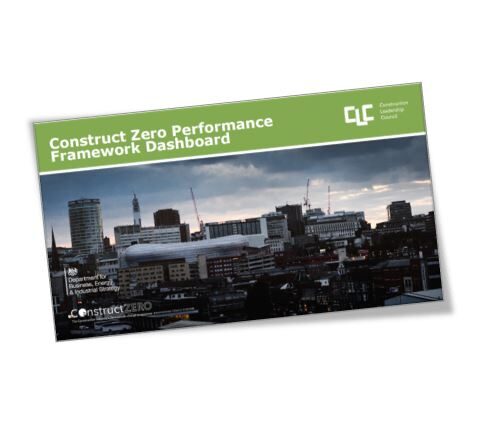
by Clair Mooney | 25 May, 2023 | Sustainability
The Carbon Reduction Code for the Built Environment has been updated to Issue 3.0 May 2023. The Code provides a mechanism that enables individual organisations to publicise their annual decarbonisation progress, and thereby collaborate and share best practice on their journey to Net Zero with the intention of accelerating progress across the industry.
Part of the Construction Leadership Council’s Construct Zero initiative, the Code brings together and aligns the plethora of sector wide initiatives. It is referenced in key documents such as the UK Construction Playbook, September 2022, the UKGBC Roadmap, and the UK Government Guidance Note Promoting Net Zero Carbon and Sustainability in Construction, September 2022. The new version of the Code and the sign-up process are available on the CSIC website.
Who is the Code for, and what makes it different?
The Code is designed for clients, contractors and supply chain members working in the built environment. In order to enable wide participation, organisations may join at a global, national or regional level as well as at a major project level.
The Code is also not prescriptive, but instead asks organisations to report their progress year on year, to keep their accreditation, setting it apart from standards. It is also designed to be collaborative, with the ability to influence the onward supply chain.
What do organisations need to do to comply with the Code?
The Code offers three levels of commitment:
- Core commitments for all organisations;
- Core commitments for client organisations and further commitments to facilitate the transition to Net Zero;
- Core commitments for supply chain organisations and further commitments to facilitate the transition to Net Zero.
All organisations must be in accordance with the minimum entry level of compliance to attain Pledger status. This means agreeing to the core commitments of setting out plans to meet net zero by 2045, including annual targets, and publishing these and the progress made against them every year. Pledger levels also requires setting an interim target to reduce net direct and indirect carbon emissions for 2030, which aligns with or exceeds government strategy. Signatory level requires signing up to additional core commitments relevant to the organisation – be it client or supply chain, and Champion level sees commitments to more ambitious collaborative progress.
What has changed since the last issue?
A complete list of changes from the last issue of the Code are listed in the Code FAQs. A key addition is that of a third core commitment – Commitment 1.3 – which requires organisations to provide clarity on which carbon-offsetting schemes they are using if any. Current Code compliant organisations should also consult the Code FAQs, which explain the version of the Code with which organisations would need to comply at renewal.
How do organisations sign up to the Code?
The Code signup form is available on the on the CSIC website. The form is accompanied by a downloadable Excel spreadsheet listing all the information required to make the sign-up process easy to complete. There is no cost to signing up to the Code.
Dr Jennifer Schooling OBE, Director of CSIC, states:
“The Code recognises that we must start making meaningful change, and we have to start making it today. Not tomorrow, not next week and certainly not next year. I urge you to visit the CSIC website to read this new issue of the Code to understand what is required and sign up. By working together towards a greater good we all make progress. Collaboration and commitment will be key to success, and with alignment of ambition across all parties we can progress towards net-zero carbon at the pace required. The Code provides an encouraging, supportive and collaborative approach to reducing carbon. It is essential that our industry reduces carbon emissions and the more organisations that sign up to the Code, the more we will achieve.”

by Clair Mooney | 20 Apr, 2023 | Main News Feed, Sustainability
In March 2023, RICS consultated on the revision of the RICS professional statement on whole life carbon. The deadline for the submission of comments was 18 April and FIS provided some feedback on the document on behalf of its members. The feedback was mainly focused around the need to provide further clarifications on technical aspects of the document, but also included a slight revision to the definition of fit-out projects. The feedback also included the request to amend the study period for a fit-out project and to clearly define the scope of the project as fit out projects – in line with the document that FIS published for its members in 2022 – here: https://www.thefis.org/knowledge-hub/sustainablility/sustainability-related-to-your-activities/net-zero/
The aim of the document is to provide a methodology to calculate the whole life carbon impact of buildings, projects and infrastructure. It is part of a wide range of industry initiatives around the need to measure the carbon emissions associated with not just the operation of buildings, but also the impact of their construction – related to the manufacturing, transport, installation and end of life of products.
The revised document includes more specific information related to a fit-out project, which makes it more relevant to FIS members.

by Clair Mooney | 25 Jan, 2023 | Sustainability
The FIS Sustainability Leadership Group is pleased to announce the launch of a learning pathway which was developed in collaboration with the Supply Chain Sustainability School.
The ‘FIS Sustainability Awareness: Doing Business Better’ learning pathway is aimed at all those curious about sustainability or looking to improve their knowledge of the subject. The aim of this pathway is to demystify sustainability by clarifying some of the language associated with the topic, such as sustainability strategy, waste management, net zero, circular economy, wellbeing, modern slavery, fairness, inclusion and respect and social value. Two optional resources are also included, covering science-based targets and embodied carbon.
FIS Sustainability Champion Flavie Lowres said:
“I am really excited about this course; as it takes only 20 minutes to complete and I hope it will allow all members of an organisation to upskill on some of the important sustainability topics”.
Special thanks to the Supply Chain Sustainability School, BW, Bryson, Lumybel, ISG and Zentia for their help in developing the course. Access the pathway here

by Clair Mooney | 16 Dec, 2022 | Sustainability
We are delighted to commend to you the first in a new series of newsletters from the Link Consortium. The Link Consortium brings together experts in building materials reuse (including FIS) looking at how the sector can adopt latest artificial intelligence and object recognition technology to provide rapid listing software to help increase reuse of used construction materials and significantly reduce carbon emissions.
This project, funded by InnovateUK, was launched in October 2022.

by Clair Mooney | 29 Nov, 2022 | Sustainability
The construction sector has taken a number of significant steps towards net zero according to data published today. At COP26 last year, the Construction Leadership Council launched its CO2nstruct Zero programme, with associated measures to track carbon reduction activities, and challenge the industry to improve in nine key areas.
The first annual review of progress sets out the evidence that UK construction is playing a leading role in cutting carbon.
The annual CO2nstruct Zero Performance Dashboard shows that the last 12 months has seen the sector:
• Train more than 500 retrofit co-ordinators, with associated business accreditation
• Connect 55,000 heat pumps by 4,100 trained & registered installers
• Deliver a 33 per cent increase in EV charging points
• Include carbon literacy in professional qualifications
Alongside these targeted measures, the CO2nstruct Zero network has grown rapidly, with more than 200 organisations now established as Business Champions and Partners under the programme. This network has played a crucial role in supporting carbon reduction policy development, feeding into UK Government work on retrofit and energy security, as well as developing its own detailed plans including a route map to cut diesel usage on sites.
Flavie Lowres, FIS Sustainability Champion said:
It was great to attend the CLC meeting to see the positive steps that are being made and the enthusiasm for change. The opportunity for the FIS members is great, but we do need to be cautious that this isn’t another false green dawn and that we see the principles cascade through to the work on the ground. We need strong collaboration to set the supply chain up to succeed. This came out strongly in the discussion as we focus on making sustainability a habit linked to effective procurement, productivity and resource management.
Construction Leadership Council Co-Chair and Construction Minister Nusrat Ghani MP said:
“We have decarbonised our economy faster than any country in the G20 and remain fully committed to supporting the construction industry in achieving its decarbonisation commitments through initiatives like Construct Zero.
“This report demonstrates the positive start our construction industry is making in the fight against climate change. I look forward to working with the CLC to accelerate progress in the years to come.”
Construction Leadership Council Deputy Co-Chair Richard Robinson said:
“Last year we asked the industry to join us on a journey towards a lower carbon future, and the response has been very encouraging”.
“We must now build on this momentum, pushing ahead with pace and purpose in 2023 as we continue to play a leading role in getting the UK to net zero.”

by Clair Mooney | 17 Nov, 2022 | Sustainability
SMEs can get grants from the Office for Zero Emission Vehicles to install electric vehicle charging infrastructure in their commercial car parks.
Eligible businesses can claim £350 for each chargepoint socket installed and £500 per parking space enabled with supporting infrastructure, up to a maximum of £15,000 per car park.






